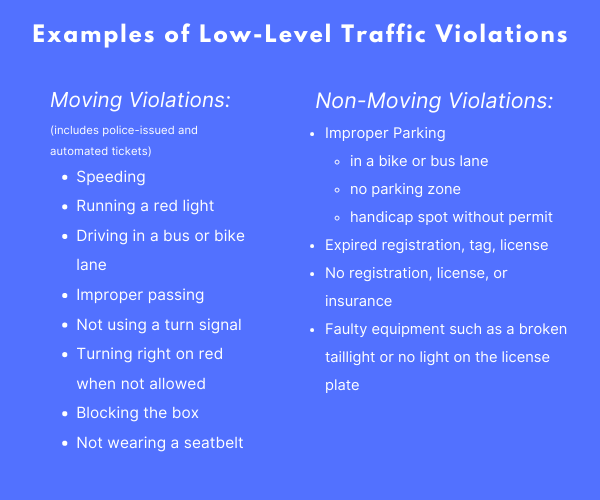On January 1st, Nevada became the latest state to remove the threat of a criminal charge for motorists who can’t pay fines for minor traffic violations.
The new law has downgraded these minor infractions from criminal misdemeanors to civil violations with civil penalties. This change only applies to low-level traffic tickets, not to tickets like reckless driving and DUI. According to the Federal Sentencing Reporter, Nevada was only one of 13 states to still prosecute minor traffic violations as criminal misdemeanors rather than civil infractions up until the beginning of this year.
We acknowledge that our position seems counterintuitive, but the NMA actually objects to local and state governments lowering the traffic court bar, downgrading routine moving violations from criminal to civil offenses while issuing lesser fines and eliminating points against defendant driving records. Why? It diminishes your rights under due process.

The Catch-22 is that challenging this loss of due process takes us right back to the same court system bent on protecting its cash flow, along with reducing the court’s administrative responsibilities. Civil court is easier for cities and states to operate—expectations are lower. If ticket holders don’t make restitution, the court will likely send the debt to an outside collector.
The expectation is that drivers will pay for their tickets to make it all go away. Fighting the ticket successfully becomes nearly impossible.

How it will now work in Nevada
- A driver who receives a minor violation for such things as speeding or failing to signal will have 90 days to respond.
- If the ticket holder chooses not to contest the violation and pay the civil penalty, the court will report the payment to the Department of Motor Vehicles.
- If the person does nothing for 90 days, the court will automatically find the ticket holder to have committed the offense and be required to pay certain court expenses.
- A person is already presumed guilty. If a driver contests the violation, the case will go through a civil hearing with a judge who evaluates the facts and then issues a ruling. The same rules will no longer apply in civil court—no possibility of discovery or a jury trial.
A traffic fine is one thing, but states and cities also impose court-imposed fees to cover administrative costs, fund special initiatives, and other criminal justice-related charges and penalties. For example, in California, a red-light camera ticket costs nearly $500 after all the fees allowed by the legislature are tacked on top of the initial fine.
Many drivers who cannot afford to pay even a minor infraction ticket will likely not pay these tickets. Not only could they lose their license, but a judge could also issue a bench warrant to the ticket holder for not paying the debt, such as in Nevada’s case before the law changed.
According to the Fines and Fees Justice Center, warrants are a counterproductive and expensive way of coercing citizens to pay a traffic ticket. For example, in Clark County, Nevada (Las Vegas), if police arrested a motorist on a bench warrant, he or she would spend almost three days in jail at the cost of over $400 paid by taxpayers.
Due to the new law, Nevada city courts are clearing bench warrants from their systems. Las Vegas is erasing nearly 35,000 warrants, North Las Vegas 16,000, and Reno 1,900. Bill sponsor Assemblywoman Rochelle Nguyen said in an interview, “This law is significant because it ends a cycle of debt that stems from a simple traffic violation that many people find themselves in because they are unable to pay.”
Some would say they did the crime, so they should have the punishment, but the harm to that person and their family might even be worse. Three days behind bars might cost a person a job, housing, and even their children if they can no longer earn money to care for them.
Driver’s License Suspensions due to Non-Payment of Fines
In 2020, Oregon Governor Kate Brown signed House Bill 4210, which, when it came into law, prohibited the state from suspending a resident’s driver’s license for not paying a traffic fine for a minor infraction. She also ordered that all outstanding court fines be cleared up to the time of HB4210 implementation in October 2020 from court records. If you received a suspension for a misdemeanor or felony infraction, such as DUI, the law did not apply.
Before she left office recently, Governor Brown wiped out about $1.8 million in unpaid fines affecting nearly 7,000 drivers pending in state circuit courts. Much of the debt was uncollectable since it was more than three years old and would likely not be recovered.
The roughly 7,000 drivers with suspended licenses in the circuit system can soon apply to have their driving privileges reinstated.
Losing a driver’s license is another surefire way of going down a spiral that a family cannot get out of any time soon.






